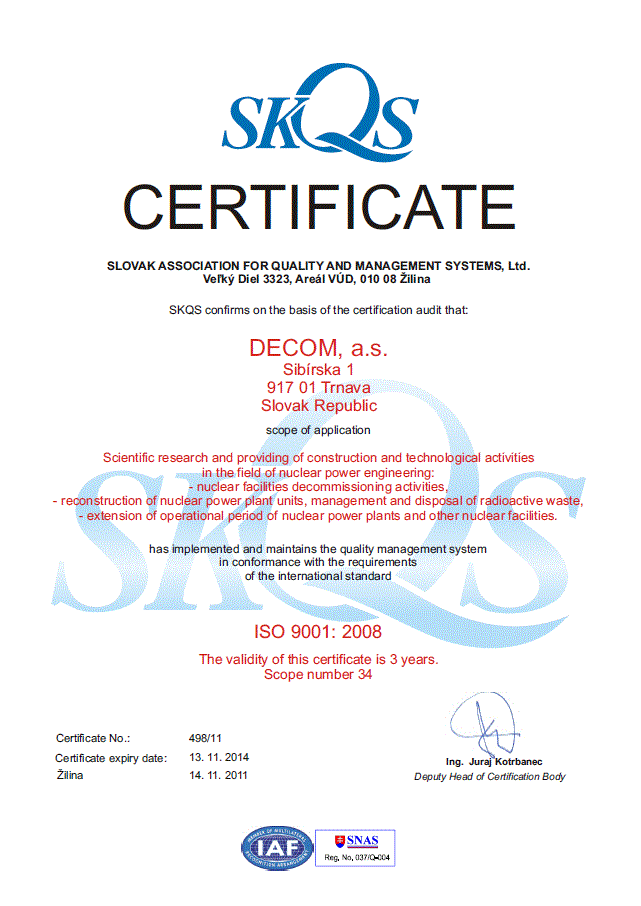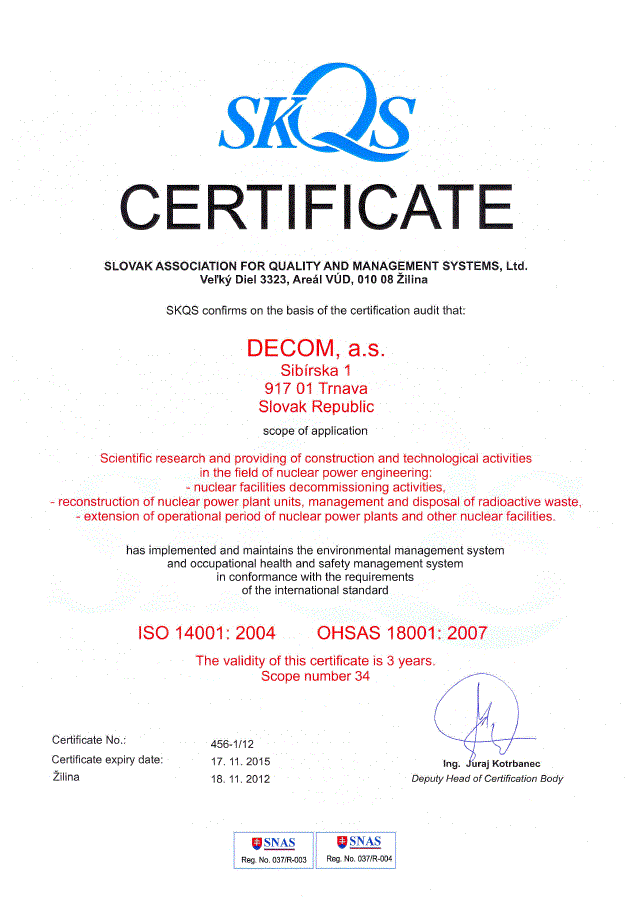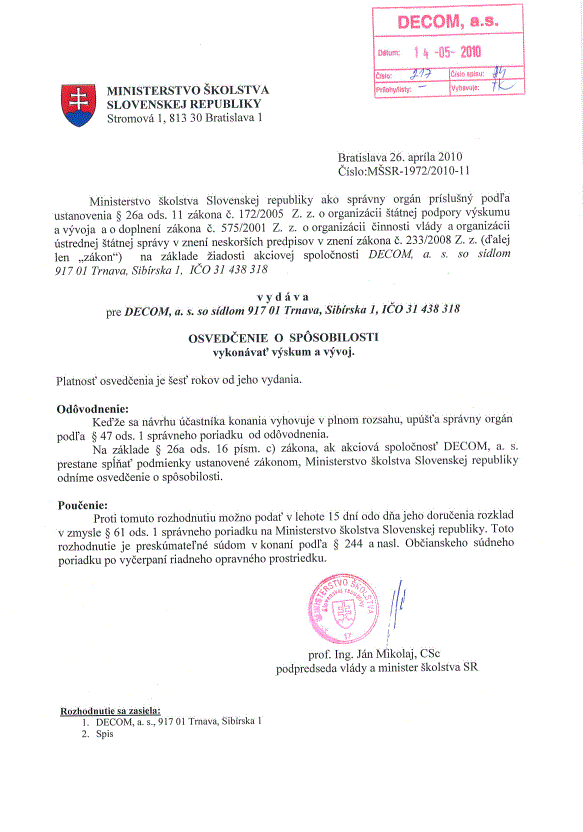| QUALITY – A BASIS OF COMPANY’S SUCCESS
The company DECOM, a. s. has implemented and certified integrated management system according to requirements ISO 9001:2008, ISO 14001:2004 and OHSAS 18001:2007. |
||
| OUR MISSION |
Providing consultation, documentation and design for operators of nuclear power plants, regulatory bodies, other domestic and foreign subjects in the area of nuclear installations decommissioning, radioactive waste management and spent nuclear fuel handling.
| RECOGNIZED PRINCIPLES |
- Meet the client’s requests specified in contract and keeping a high professional level of all products during all phases of project life cycle.
- Provide services in accordance with legislative and other requirements of involved bodies.
- High proficiency of our staff ensures quality of provided services.
- Motivate employee to continuous professional and expert work attitude in order to keep high quality of outputs, hence enhance the reputation of company.
- Systematically analyze, evaluate and improve our processes and provided services.
- Continuously improve our integrated management system including:
- Quality management system according to ISO 9001;
- Environmental management system according to ISO 14001;
- Occupational health and safety management system according to OHSAS 18001.
| CERTIFICATES AND AUTHORIZATIONS OF A COMPANY |
 |
 |
 |
||
| ISO 9001:2000 | ISO 14001:2004 OHSAS 18001:2007 |
Expert qualification to conduct research and development activities |
| CERTIFICATES AND AUTHORIZATIONS OF EMPLOYEES |
- Ing. Peter Bezák, PhD. owns the certificate „Operator of Secondary Circuit“ (1984) and the certificate „Operator of Reactor“ (1986).
- Ing. Beáta Drobná owns certificate acquired at the course „Quality Management Systems – internal audit of the system in accordance with ISO 9001:2000 and ISO 19011:2002“.
- Ing. Marek Vaško, PhD. owns the certificate of attendance at Decommissioning of Nuclear Installations Training Course (2004) and the certificate of attendance at VISIPLAN 3D ALARA planning tool Training Course (2006) both organised by SCK-CEN in Belgium.
- Ing. Igor Matejovič, CSc. is included in the list of experts qualified to perform environmental impact assessment according to paragraph No. 61 of the Act No. 24/2006 Coll. He owns the certificate of attendance at International Seminar on Nuclear Safety. He attended Course of Radioactive Waste Management and Nuclear Fuel Handling in Tokai, Japan (2001).
- Ing. Jozef Prítrský, PhD. owns the certificate of attendance at Regional Training Courses on Safety Assessment Methodologies for Near Surface Radioactive Waste Disposal Facilities organised by International Atomic Energy Agency in Vienna.
- Ing. Ján Timuľák, CSc. is included in the list of experts qualified to perform environmental impact assessment according to paragraph No. 61 of the Act No. 24/2006 Coll.
- Ing. Jozef Prítrský, PhD., Ing. Tomáš Hrnčíř, PhD. and Ing. Michal Pánik, PhD. own 2 certificates of attendance at Quintessa GoldSim RT Training Courses devoted to radionuclide transport through complex environment. These courses were organised by Quintessa in Henley-on-Thames, Great Britain (2010, 2011).
| OCCUPATIONAL HEALTH AND SAFETY POLICY |
OH&S policy develops QMS policy in more detail and meets the requirements stipulated in the Act No. 124/2006 Coll. on occupational health and safety.
OH&S policy is document representing the principal aims, intentions and strategy of company in the field of injury prevention – zero personal accident rate, improvement of working conditions and working environment. It represents company philosophy of work culture and protection of employees. OH&S policy commitments of both employer and employees in the area of occupational health and safety enhancement.
The following preconditions are necessary to meet arranged goals, i.e. achievement of zero personal accident rate, enhancement of working conditions and working environment:
- Assignment of work to employees in compliance with their health status;
- Familiarization of employees with OH&S regulations, working orders, risks and hazards associated with working activities in verifiable and sufficient manner;
- Provision of appropriate personal protective equipment based on risk analysis;
- Performance of risk analyses, i.e. to be aware of possible risk, determination of threat level and subsequently taking adequate technical and organization measures;
- Development of adequate conditions for healthy and safety work during working time considering:
- technological aspects;
- organizational aspects.
Progressive management of occupational health and safety and it’s useful fitting together with management of other company activities could lead to:
- Enhancement of work culture;
- Improvement of working and creative capability of employees;
- Enhancement of company competitiveness and company position in market economy.
We decided to make our company successful by continuous improvement of both quality of our work and health protection of our employees. Occupational health and safety is strategic goal, that will be taken into account in all decision-making processes of our company.


